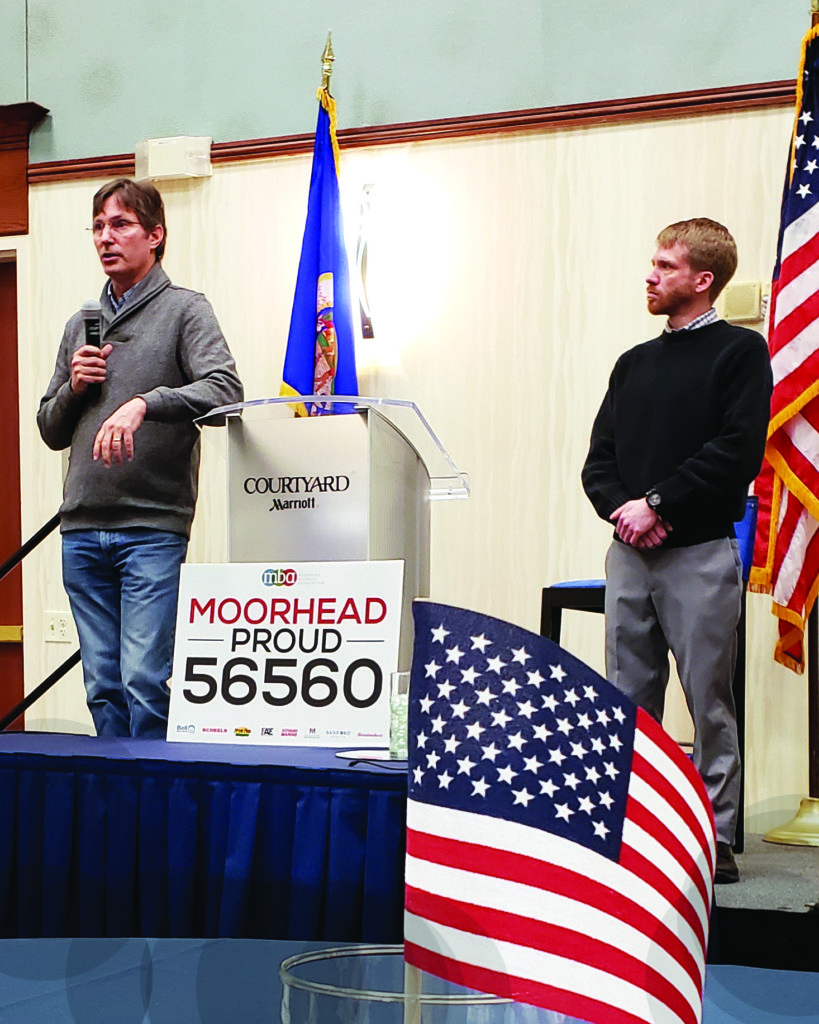
Nancy Edmonds Hanson
hansonnanc@gmail.com
“I’m excited about garbage,” State Rep. Ben Lien told a gathering of local business leaders last week. Then he narrowed it down considerably to Clay County and Moorhead’s top priority for the 2020 legislative session – construction of a new Clay County Resource Recovery Facility to replace the worn-down 45-year-old facility on Highway 10.
The project has been a top priority for the city and county for several years. Owned and managed by Clay County, it handles 30,000 tons of solid waste collected in Moorhead and other cities, as well as recovery of problem materials like hazardous waste and electronics.
“It’s not the type of project that you campaign on,” said Lien, a Democrat who has represented Moorhead since 2013. “But it’s critical for the continued growth of Clay County, and it’s important to get it done.” With the support of the state Pollution Control Agency, he said, he is hoping this will be the session when Clay County’s request for $8.5 million toward the $12.5 million project finally passes.
Lien and Eken, a Twin Valley Democrat who served five terms in the House before election to the Senate in 2012, laid out their priorities at a forum Wednesday, Jan. 8, sponsored by the Moorhead Business Association. The two head back to St. Paul soon for the 2020 Minnesota Legislature, which begins Feb. 11. The biennial bonding session will focus on projects competing for state funding. The two legislators agreed that the $1.3 billion state budget surplus adds optimism to the debate, but still falls far short of requests totaling more than $5.3 billion.
They pointed out that most of the surplus – $1.1 billion – represents one-time funds. “We need to consider a much more robust amount of bonding” than the $1 billion of recent sessions, Eken said, citing about $3 billion in require3d maintenance projects that have been pushed to the back burner. “People don’t run on maintenance, but it’s vital to get it done.”
In addition to the long-deferred Clay County solid waste facility, the senator listed four other local priorities, including presdesign and preliminary work on the 11th Street railroad underpass; a community aquatic center for Moorhead, “critical for our quality of life;” and renovation of Minnesota State University Moorhead’s oldest building, Weld Hall.
While bonding is the primary focus of the session, Lien pointed out a major missed opportunity of 2019, a measure to make insulin more affordable. “Gov. Walz and a committee have been working on it in the interim,” he said. “I’m hopeful we can get it done early on.”
He also pointed to the need for a long-term transportation bill, a proposal that failed last session due to the proposed gas tax to underwrite maintenance of highways and bridges. “Maybe it won’t be a 20 cent increase – perhaps 5 cents. Nevertheless, we have to get it done. Every penny represents $30 million for roads,” he added. “Every one of our communities, our farms, our businesses and our students rely on them.”
Eken plans to continue to work on his proposal for a constitutional amendment to provide stable funding for long-term care. “Last session, we got the conversation going,” the second-term senator said. “I’m open to looking at other proposals and alternatives.” His constitutional amendment, he says, would engage the public in a badly needed conversation on how Minnesota will deal with care for its elderly. “We are entering a new era in world history, with the largest-ever percentage of the population in their older years,” he pointed out. “We need to get a handle on it.:
Lien brought up funding for higher education. He recounted how state support for colleges and universities during the years when Minnesota grappled with a budget deficit. “We cut back substantially on our partnership with higher ed,” he said. “We went from a situation in which the state paid two-thirds of the cost, with the balance made up by tuition, to the reverse of that formula. We can’t be too critical of tuition increases that they were forced into by state cuts.” He noted that the level of state support has regained ground in recent years, now approaching 50%. “We need to et back to two-thirds. Then we can look seriously at a tuition freeze.”
Eken pointed to past successes in the 2019 legislative session – starting with the long-desired goal of adding funds for the Border Cities Enterprise Zones to the state’s base budget and increasing the Ag2School tax credit, which he called “critically important to passing a lot more school referendums.” He also cited $20 million in funding to combat opioid addiction drawn from taxes on the pills’ manufacturers, along with two measures protecting elderly residents – a ban on terminating long-term care contracts without a so-called alternative “soft landing,” and licensure of assisted living facilities.
He expressed optimism for the deliberations ahead. “We have a good tradition here in Minnesota of working together to find common ground. The pendulum swings back and forth.” Noting that Minnesota’s is the only legislature in the country with divided control of the two parties, he noted, “When both sides buy in, we’ve shown time and again that we can find long-lasting solutions.”


